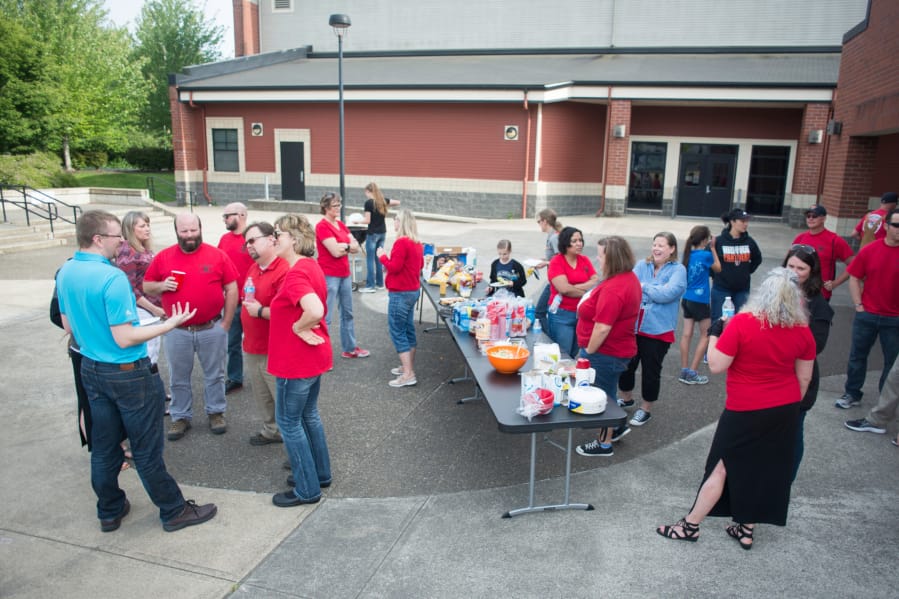It’s likely to be another hot summer for union negotiations in Southwest Washington and around the state as school districts and their teachers unions begin debating how to spend the millions of additional dollars districts will receive under the new school funding model.
Unsurprisingly, the two sides are already at odds.
The Washington Education Association is urging its members to push for 15 percent raises for teachers, and 37 percent raises for the classified support staff local unions represent. Clark County’s largest school districts, however, anticipate multimillion-dollar drops in revenue once local levies are capped next year.
“There’s definitely a misunderstanding about the new money that’s coming into the district,” said Brett Blechschmidt, chief financial officer for Vancouver Public Schools.
Districts so far are tight-lipped on what raises, if any, educators should expect, citing ongoing negotiations.
At the center of those discussions is the McCleary fix, the Legislature’s response to the 2012 state Supreme Court ruling that determined the state was failing to fully fund basic education. After years of legislative gridlock, the Legislature last year raised its state property taxes for education and, beginning next year, capped local levies. That means more state money but less local money for schools.
There’s a few other points to remember when it comes to teacher salaries this summer:
• The Legislature eliminated the statewide salary schedule, a grid that previously set base pay for teachers based on their experience and education level. That leaves it up to local school districts to negotiate their own salary schedules.
• Minimum teacher salary was set at about $40,000, while maximums are capped at about $90,000.
• The state must pay for “basic education,” not local levy revenue. Districts are no longer supposed to spend their local levy funds on base teachers salaries.
• And, most importantly, the Legislature this year added nearly $1 billion for salaries after the Washington state Supreme Court ruled last year that it hadn’t fully complied with the McCleary ruling.
It’s that last point, in large part, that’s driving area unions to push for big raises.
“I don’t know how there’s any idea that it doesn’t belong in our pockets,” said Rob Lutz, president of the Evergreen Education Association, of the additional funding. “It needs to go toward salaries.”
But officials from area districts say it’s not so simple, noting the coming drop from capped local levy rates. While Evergreen Public Schools, for example, anticipates it’ll see an additional $21.2 million in discretionary funds this year due to increased state revenue, once the local levy cap goes into effect, that declines to an additional $6.9 million. Vancouver Public Schools, meanwhile, expects an additional $24.4 million in discretionary funding this year. After local levies are capped, however, that declines to about $14 million, according to data provided by the district.
Rick Wilson, executive director of the Vancouver Education Association, said he and the negotiating team understand the pot of funds from local levy dollars are declining. But, he said. “the districts are getting more money than they’ve ever gotten before.”
“Our position is that money, literally that billion through the state, is earmarked specifically for teachers’ salaries,” Wilson said. “They can’t take that.”
This summer’s negotiations are likely to come with some twists and turns, and already have in some Washington school districts. The Everett Herald reported last month that the Mukilteo School Board is refusing to negotiate with its teachers union in light of the legislation. The Kelso School District is backing away from claims it made that the McCleary fix would bankrupt the school in the coming years, according to The Daily News. Kennewick teachers held a march and rally last week to demand higher wages, while the district said it’s committed to “cost-of-living adjustments,” according to the Tri-City Herald.
In one of the more creative demonstrations, the Washougal Association of Educators on Wednesday hosted a tailgate outside Washougal High School as the negotiating team met inside. Dressed in union red, teachers slung hot dogs and snacked on potato chips as they waited for some news of what was going on inside.
“We are working for a respectful contract; a contract that builds the bonds between the Washougal community, the Washougal Public Schools, and the people who work in that system,” union President Frank Zahn said by email following the meeting. “We have not yet fully presented our requests to the district and shall not do so until we have settled the compensation issues that are so important in this negotiation.”




